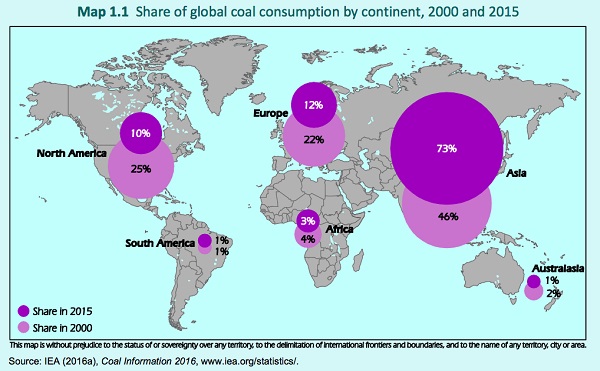1. Urban rich threaten China’s emissions cuts
Every year 20 million people move from the country to the city in China. Within that group is an urban wealthy class, some 5% of the population, and growing, who are responsible for 19% of household emissions. They want to live in big houses, drive 4x4s and adopt a Western life-style.
The very rich generate 6.4 tons of CO2 per capita per year − nearly four times the national average of 1.7 tons. Costa Rica and Thailand are mentioned as countries at a similar level of development, with only one tonne per capita.
2. Coal still on the rise
China’s use of coal peaked in 2013, but it is still building 205 gigawatts (GW) of coal capacity, which would add to around 950GW already operating. The IEA says this makes no economic sense.
In India, coal consumption is still increasing, but:
- one-third of coal plants are thought to be operating at a loss, says Matthew Gray, senior analyst at CTI. In addition, some 37 half-built coal units totalling 16GW remain unfinished, largely because of financial constraints, according to a government report.
The story of coal has shifted to Asia, with Asia accounting for 46% in 2000, 73% in 2015, and a projected 76% in 2021:

The IEA says that to stay within 2C we should decrease coal usage by 8% by 2021, and eventually eliminate it. They think coal will increase by 3%.
3. Government ‘Not Ruling Out’ GIANT FUCKING STORM As Cause Of SA Blackouts
This dates from October 1, but it has just been sent to me. Too good not to share. Here are the first three paras:
- The Federal Government says it is considering the full range of potential causes for the recent South Australian power outage, including electricity pricing structures, the dependence on renewable energy in the state, and the fact that the biggest fucking storm in 50 years literally ripped 22 electricity pylons out of the ground.
Electricity expert Barnaby Joyce said there were any number of factors that could have contributed to the power going out, with the fact that electricity wires were actually cut in half potentially amongst them.
“The way the energy is made is definitely the most likely cause. But we have been told that tornado-force winds did ravage the state just before the power went out, so we’ve tentatively added that to the list of possibilities as well”.
I suspect the southern part of the continent are now getting the big storm fronts we used to get in SEQ. Now we get broken up rubbish, often a big dump or nothing, and at other times a lot of wind with less humidity.
4. On an ocean planet, we are wrecking the ocean
It is truly insane, but that’s what we are doing, says Bill McKibben, reflecting on the whopping study of ocean warming by the IUCN (International Union for Conservation of Nature) in September. There’s more from Oliver Milman in Honolulu, and from the ABC.
Around 93% of global warming goes into the ocean, enough to heat the surface of the Earth by a devastating 36C over the past century. The oceans may disgorge some of their heat even if we stem greenhouse gas emissions now. Just about all the news is bad.
- The IUCN found fish fleeing toward the poles, disrupting fisheries that lasted throughout the Holocene; it found coral reefs bleaching at an ever-accelerating rate; it found, maybe most ominously, that “the warming is having its greatest impact upon the building blocks of life in the seas, such as phytoplankton, zooplankton and krill.” That is to say: we are profoundly mucking around with the very bottom of the planet’s most basic chains of life.
These risks will accelerate as the oceans warm faster: their temperature could rise four degrees celsius if we let the planet keep warming. And as that happens, of course, the warming will start to feed on itself. There are, the IUCN reminds us, huge quantities of methane frozen beneath the sea. Each degree of temperature increase will thaw some of that.
Also, warmth in the oceans brings more disease for plants and animals. We are literally making the oceans sick.
5. Finally, lower electricity bills
Our last electricity bill was less than half the corresponding period last year. Probably there were three main reasons.
First, our son moved out. The main impact is that we seldom use the aircon he had in his room, a somewhat airless room on the southern side and the only space we have airconditioned.
Secondly, we turned off one of the fridges downstairs, so now we only have two.
Third, we bought one of those pool covers where you put the pool on minimum maintenance in the off-season.
Finally, I cleaned the solar panels, but I don’t honestly think that made much difference.

